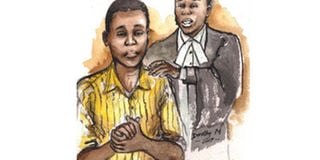When children offend

What you need to know:
- Part 3:Rights of children. In a continuation from last week’s article, what are the procedures used when children are the perpetrators of crime? Male children are at risk of descrimination.
A boy petitioned the High Court when he was arrested, remanded and prosecuted for having sex with a girl who was also a minor. One of the grounds of the petition was that he was being discriminated against on the basis of his sex. This, to him, was unconstitutional.
His lawyer cited a similar case when a girl, who was slightly older than her boyfriend, had sex with him. The boy was arrested and charged in court. The girl was however not arrested. An appellant court ruled that the boy had been discriminated against on the basis of sex when he was arrested and charged instead of prosecution charging both the girl and the boy for defilement. At the time of commission of this particular offence both parties were minors. To court, the blame for the act should not have been wholly sifted to the boy but should have been apportioned against both of them.
The High Court could not agree more. The judge considered the penalties in the Sexual Offences Act harsh. To the judge these were minors, in fact teens, with their hormones raging madly when they decided to experiment on their prowess mutually. Both children did not have the legal capacity to consent to sex and so both children had defiled themselves. To the judge the best course of action would have been to offer care and protection for both of them as they were in need of guidance and counseling rather than criminal penal sanctions.
The judge did not spare the Director of Prosecutions (DPP) who in law is guided by the following principles;
• Impartiality and gender equity
• The rules of natural justice
• The need to serve the cause of justice, prevent abuse of the legal process and public interest.
The judge concluded that the boy was discriminated against on the basis of sex in that he was charged alone but in reality they both needed protection against sexual activities.
Right to fair trial
The constitution is unequivocal on the right to a fair trial. The courts have also ruled that trial by ambush is unconstitutional. The law states that every accused person has a right to a fair trial and this includes the right to;
• Have adequate time and facilities to prepare a defense.
• Be informed in advance of the evidence the prosecution intends to rely on, and to have reasonable access to that evidence.
• Have an advocate assigned to the accused by the State and at State expenses, if substantial injustice would otherwise result.
The United Nations Convention on the Rights of the Child provides that a child deprived of his or her liberty has a right to prompt access to legal and other appropriate assistance.
Another of the grounds of the petition was that the accused boy requested for but was not given witness statements. Court records showed that the boy requested for witness statements on six different occasions and the magistrate directed that he be given the statements. At one time during the court proceedings the boy told court, “I am not ready to proceed. I do not have copies of the witness’ statement.”
This was not refuted and no reasonable grounds were given why the statements were not given to the boy. The High Court faulted the trial court for failure to summon the investigating officer to explain this or direct the prosecutor to photocopy the witness statements and avail these copies to the minor.
Legal representation
Court proceedings also showed that when the trial commenced, the boy did not have legal representation and the prosecution did not take this into account. The High Court was reminded of an earlier ruling where a judge stated that: “The underlying principle is that the criminal justice system should take account of a defendant’s age, level of maturity, and emotional capacity. It is only by doing so that the system can redress the imbalance which is the inevitable result where young person is confronted by the power of the criminal justice.”
To the High Court the boy was left alone to conduct a hearing in an offence which was complex and which attracts a minimum sentence of 15 years imprisonment. Court declared that the boy’s right to a fair trial was grossly violated and as a result he suffered substantial disadvantage for lack of legal representation.




